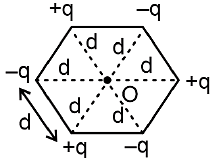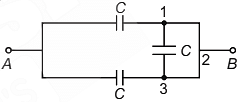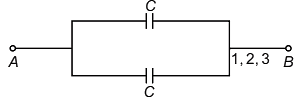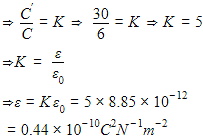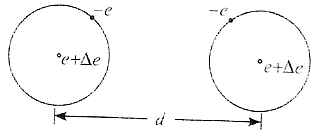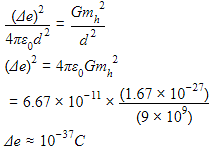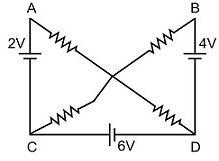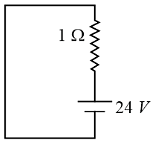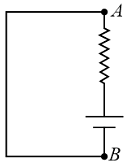NEET Minor Test - 5 - NEET MCQ
30 Questions MCQ Test NEET Mock Test Series 2025 - NEET Minor Test - 5
The angle between the electric lines of force and the equipotential surface is
Two point charges −q and +q are placed at a distance of L, as shown in the figure.
The magnitude of electric field intensity at a distance R(R≫L) varies as:
| 1 Crore+ students have signed up on EduRev. Have you? Download the App |
The distance between the two plates of a parallel plate capacitor is doubled and the area of each plate is halved. If C is its initial capacitance, its final capacitance is equal to:
Six charges +q, −q, +q, −q, +q and − q are fixed at the corners of a hexagon of side d as shown in the figure. The work done in bringing a charge q0 to the centre of the hexagon from infinity is: (ε0. - permittivity of free space )
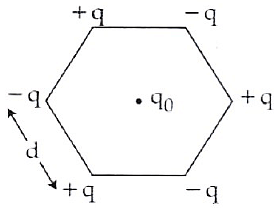
The equivalent capacitance of the combination shown in the figure is

Twenty seven drops of same size are charged at 220 V each. They combine to form a bigger drop.
Calculate the potential of the bigger drop.
In a certain region of space with volume 0.2 m3, the electric potential is found to be 5V throughout. The magnitude of electric field in this region is:
The capacitance of a parallel plate capacitor with air as medium is 6µF. With the introduction of a dielectric medium, the capacitance becomes 30µF. The permittivity of the medium is:
(E0 = 8.85 × 10−12C2N−1m−2)
Two point charges A and B, having charges +Q and −Q respectively, are placed at certain distance apart and force acting between them is F. If 25% charge of A is transferred to B, then force between the charges becomes
An electron falls from rest through a vertical distance h in a uniform and vertically upward directed electric field E. The direction of electric field is now reversed, keeping its magnitude the same. A proton is allowed to fall from rest in it through the same vertical distance h. The time of fall of the electron, in comparison to the time of fall of the proton is
The electrostatic force between the metal plates of an isolated parallel plate capacitor C having a charge Q and area A, is
Suppose the charge of a proton and an electron differ slightly. One of them is -e, the other is (e+Δe). If the net of electrostatic force and gravitational force between two hydrogen atoms placed at a distance d (much greater than atomic size) apart is zero, then Δe is of the order of
[given ma of hydrogen mh = 1.67×10−27kg]
A capacitor of 2 μF is charged as shown in the diagram. When the switch S is turned to position 2, the percentage of its stored energy dissipated is

An electric dipole is placed at an angle of 30° with an electric field intensity 2 × 105NC−1.It experiences a torque equal to 4 N m. The charge on the dipole, if the dipole length is 2 cm, is
People living at sea level have around 5 million RBC per cubic millimeter of their blood whereas those living at an altitude to 5400 metres have around 8 million. This is because at high altitude
An electric bulb is rated 220 V–100 W. The power consumed by it when operated on 110 V will be
A (100 W, 200 V) bulb is connected to a 160 V power supply. The power consumption would be
A conductor wire having 1029 free electrons carries a current of 20 A. If the cross-section of the wire is 1 mm2, then the drift velocity of electrons will be
The current passing through the ideal ammeter, in the circuit given below, is
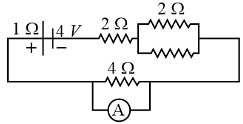
Shown in the figure is a meter-bridge set up with null deflection in the galvanometer. The value of the unknown resistor R is
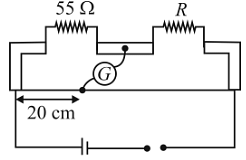
Constant current is flowing through a linear conductor of non-uniform area of cross-section. The charge flowing per second through the area of conductor at any cross-section is
A meter bridge is used to determine the resistance of an unknown wire by measuring the balance point length l. If the wire is replaced by another wire of same material but with double the length and half the thickness, the balancing point is expected to be
Potential difference between points A and B (i.e. VA - VB) is
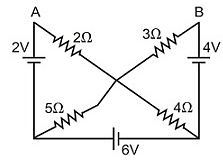
When the switches are arranged so that the current through the battery is maximum, what is the voltage across points A and B-
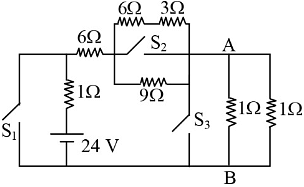
A uniform conducting wire of length 12a and resistance 'R' is wound up as a current carrying coil in the shape of,
(i) an equilateral triangle of side 'a'.
(ii) a square of side 'a'.
The magnetic dipole moments of the coil in each case respectively are
The magnetic field B on the axis of a circular coil at distance x far away from its centre are related as:
A rectangular coil of length 0.12 m and width 0.1 m having 50 turns of wire is suspended vertically in a uniform magnetic field of strength 0.2Weber/m2. The coil carries a current of 2 A. If the plane of the coil is inclined at an angle of 30° with the direction of the field, the torque required to keep the coil in stable equilibrium will be
|
1 videos|26 docs|111 tests
|
|
1 videos|26 docs|111 tests
|



